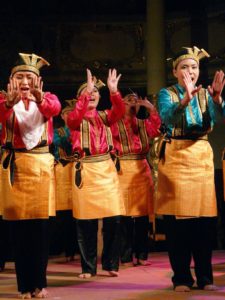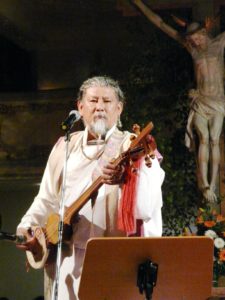Let us Be United in Love
Musica Sacra International Festival
Walter Vorwerk,
Music Journalist
21 – 26 May 2010, Marktoberdorf/Ostallgäu, Germany
“Let us be united in love and find our peace of mind together with our friends. Let us recognise our mistakes in the cleansing light of Heaven…” were the words sung by the Erguvan Ensemble, Istanbul, at the 10th Musica Sacra International Festival in Marktoberdorf, Bavaria. The text is by sultan Walad (1226-1312), the son of the Islamic mystic Jalal al-Din Muhammad Rumi (1207-1273) who was one of the most important medieval Persian poets. For his Sufi reform teachings of love, humanity and unity, “Maulana” in Persian, or “Mevlana” in Turkish, he was called “Lord and Master”. Music and dance represent love and establish a connection with God. The openness of this Islamic dimension was expressed again during this 10th Musica Sacra International Festival. The festival, sponsored by Arbeitsgemeinschaft Deutscher Chorverbände (ADC, Working Group of German Choir Associations) and established by Dolf Rabus in 1992, was created to be an encounter of the world religions (Christianity, Judaism, Islam, Hinduism and Buddhism) through music as a means of reducing misunderstandings and developing a climate of mutual respect and tolerance. The ensembles and artists came from Denmark, India, Indonesia, Israel, Italy, Jordan, Sweden, Tibet, Turkey, Ukraine and the host country, Germany. Thirteen concerts were given in churches, concert halls, castles, mosques and synagogues. Once again, the event was exemplary for putting into practice visions of a peaceful togetherness of peoples.
An interesting fact is that this became evident even within the different groups and in the joint concerts. Here are a few examples:
Aida Swenson-Simanjuntak came with her Indonesian children’s and youth choir CORDANA, which she created in 1992. The ensemble unites children from Muslim, Hindu and Christian families and is a living example of how different religions can interact peacefully. Aida’s aim is to make Indonesian children and youngsters sing and help them get a music education. Most of the families are poor and do not have the means to pay for this. The festival public was fascinated by the immense commitment of these youngsters during their concerts.

“The blessed day” was the title of an improvisation on a Swedish folksong, in which the Indian Raga singer Ashish Sankrityayan (Hindu), the Swedish St. Jacobs Vocal Ensemble (Christian) and a member of the Israeli Collegium Singers Tel Aviv (Jewish) playing the sitar made music together under the direction of Gary Graden.
The Tibetan Loten Namling (Buddhist), a friend of His Holiness the Dalai Lama, who lives in exile in Switzerland, and the Indian Ashish Sankrityayan sang together in the Augsburg synagogue.

In the Aswanuta Global Voices youth choir from Jordan, Muslims and Christians sing together under the direction of Shireen Abu-Khader and André de Quadros … Conductor Shireen is a Christian; after music studies in the USA she now teaches in Ramallah and Jerusalem. The artistic director, André, is a music education professor at Boston University. He says: “We want to show the musical riches of this world und promote singing together beyond borders”. This is the spirit of Marktoberdorf.
Seven conferences were also part of the festival programme.
It is noteworthy that Musica Sacra International has grown geographically. Within the programme “Musica Sacra on Tour”, several groups participated in the Second Ecumenical Church Congress in Munich; they gave concerts at the Trinity Church in Worms and at the Musica Sacra Festival in Chimay, Belgium. The spirit of Marktoberdorf bears fruit in another field: one project is called “Toleranz macht Schule (tolerance sets a precedent) – for a peaceful future for our children”. Within this programme, movies with different religious contents were shown in schools, and groups illustrated these religious contents with their music. Festival director Dolf Rabus: “For us it is extremely important to work with children, not only because they might be our future public but also because it is necessary to confront young people with the idea of tolerance as early as possible so that we will remain an open country. In my opinion, this is just as important for Germany as for other countries”…
Comments on the Musica Sacra festival in Marktoberdorf
Loten Namling: “The fact that musicians from different religions meet here is Utopia become reality… Music has united us – this is something very beautiful. We have the feeling that we are really doing something for a better world… This gives me renewed strength and is a great honour for me”.
Gary Graden, choral director of St Jacob’s church, Stockholm: “… For instance, I was very much concerned about finding a way for my Swedish singers to perform together with the Tibetan and the Indian singers. We came up with an idea how to do this very simply – an improvisation which expresses our common feelings. That is electrifying, a wonderful encounter of people of different ages, voices, languages and cultures. For me, this open, creative, atmosphere is part of spirituality”…
Alexander Vatsek (Ukraine), director of the Oreya chamber choir, and IFCM member: “To meet, to listen to each other, to talk to each other, singing together – that is Marktoberdorf. Of course, in each religion, there are normal believers and fanatics. … God exists for all of them … The Divine that unites us is Love. It is not important whether one comes from Turkey, Indonesia or the Ukraine. Music unites us. For us, music is the language of the heart, and this is why we understand each other and we learn from each other…”
Volker Hempfling, choral educator and director of the Kölner Kantorei choir: “Music is the least complicated way of moving towards each other, as shown by Musica Sacra. The Augsburg diocese, which has banned from its churches musicians from other religions, should think about this; they should not only talk about ecumenical dialogue but also practise openness towards other religions”.
Aida Swenson-Simanjuntak: “Our members come from three different religions. We concentrate on music and texts and feel responsible for these, no matter whether we make music on Koranic, Biblical or Mantra texts. All of them have in common the message of love. We are Indonesians, and religions do not separate us… I am deeply touched by what happens at the Musica Sacra festival… we also need something like that in Asia, in order to contain violence”…
Shireen Abu-Khader: „ For me, the festival is a fantastic opportunity to meet so many people from different cultures. We are a multicultural choir and we try to put into practice our visions of how to live together. I am a Christian, but in my choir there are many Muslims; we get on very well together. Of course we do not overlook the fact that there is violence all around us… Music is a powerful means of promoting tolerance and peace. Musica Sacra proves that it is possible for people from different cultures to come together and implement their visions”…
Avner Itai, founder and director of Collegium Singers Tel Aviv, Israel – he belongs to those who criticise their government’s policy concerning Gaza – : “The idea of Musica Sacra and its implementation is wonderful. We in Israel are trying to do this in a small way: for many years my group has been part of the ‘Voices for Peace’ project. We are practising Jewish-Arab cooperation and perform together Jewish, Arab and Christian music. Here in Marktoberdorf we have a great opportunity to learn new things. … It is particularly important for us to see how other choirs from other continents and other cultures perform, and how traditional elements are integrated into compositions. It was very interesting for us to see how, for example, the Jordanian choir has built its programme”.
E-mail: walter.vorwerk@gmx.de
Translated from the German by Jutta Tagger, France
Revised by Gillian Forlivesi Heywood, Italy